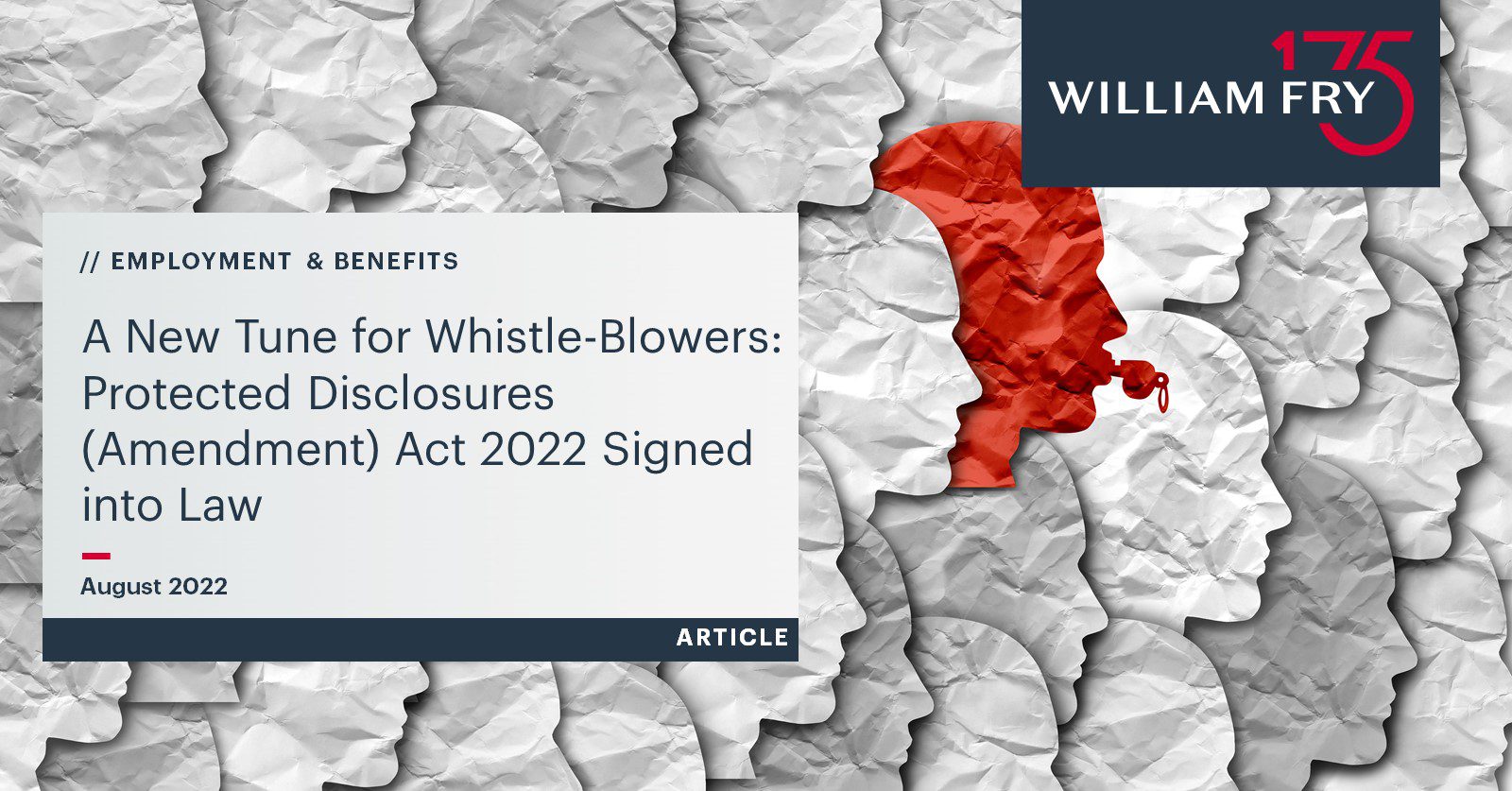The Protected Disclosures (Amendment) Act 2022 (2022 Act) has now been signed into law. The 2022 Act transposes the EU Whistleblowing Directive and amends the existing Irish framework for the protection of whistle-blowers under the Protected Disclosures Act 2014 (2014 Act). A statutory commencement order is necessary to bring the 2022 Act into operation.
The key features of the 2022 Act (some of which were outlined in our previous article on the topic) are as follows:
1. Scope of Protection
The 2022 Act expands the scope of protection by extending the definition of “worker” to include:
- board members (including non-executive members);
- shareholders;
- trainees;
- job applicants; and
- volunteers.
Under the previous legislation, protection was limited to information that came to a worker’s attention in connection with the worker’s employment.
2. Relevant Wrongdoing
The definition of ‘relevant wrongdoing’ has been extended by the 2022 Act. These are the types of wrongdoings about which an individual may make a protected disclosure. A ‘breach’ is a new relevant wrongdoing for the purposes of the 2022 Act. It is defined as an act or omission that is unlawful and falls within the scope of certain EU acts relating to, amongst other things, financial services, anti-money laundering and terrorist financing (AML/TF), public health and consumer protection.
The 2022 Act includes a carve out which specifically excludes grievances about interpersonal conflicts between the reporting person and another worker or about his/her employer which relate exclusively to the reporting person.
3. Internal Reporting Channels and Procedures
Employers with 50 or more employees are required to establish internal reporting channels and procedures to enable workers make protected disclosures.
- Employers with 50 to 249 employees benefit from a transitional period which does not require such channels to be established until 17 December 2023.
- However, employers with 250 or more employees must establish such reporting channels and procedures as soon as the 2022 Act is commenced.
Public bodies and organisations in certain sectors will not benefit from the transitional period or the 50-employee threshold as they are already required to have such channels and procedures in place. Such sectors relate to financial services, products and markets, the prevention of money laundering and terrorist financing, transport safety and the protection of the environment.
Feedback must be provided by an impartial person designated by the employer to the reporting person within three months of the report. The reporting person can make a written request for further feedback. If requested, it must be provided at intervals of three months until the procedure relating to the report is closed. Helpfully, the 2022 Act permits internal reporting channels and procedures to be operated (1) internally by a person or department designated by the employer or (2) provided by an external third party authorised by the employer.
4. Penalisation
The 2022 Act includes a new, broader definition of penalisation that covers any direct or indirect act or omission prompted by the making of a protected disclosure and causes or may cause unjustified detriment to the worker including:
- suspension lay-off or dismissal;
- demotion;
- loss of opportunity for promotion or withholding of promotion;
- a negative performance assessment or employment references; and
- blacklisting.
A person who alleges to have suffered penalisation as a result of making a protected disclosure can now apply for interim relief in the Circuit Court within 21 days following the date of the last instance of penalisation.
5. Burden of Proof
Under the 2022 Act, employers will now have to discharge the burden of proof because penalisation will be deemed to have occurred as a result of the making of the protected disclosure unless an employer can show the act or omission was duly justified.
6. Transitional Measures
Certain protections under the 2022 Act will apply retrospectively in certain scenarios. Amongst other scenarios, this includes where a report constituting a protected disclosure was made under the 2014 Act and either: (1) penalisation occurred, but proceedings are not initiated until after the commencement of the 2022 Act; or (2) penalisation occurred after the commencement of the 2022 Act.
Further, the confidentiality and data protection requirements under the 2022 Act shall apply to all reports made by those who fall within the scope of the old and new definitions of ‘worker’ regardless of whether the report was made before or after the enactment of the 2022 Act.
7. Offences
The 2022 Act creates new offences, including, amongst other offences:
- failing to establish, maintain and operate internal reporting channels and procedures;
- the hindering of, or attempting to hinder, a worker in making a report;
- penalising, or threatening penalisation or causing or permitting any other person to penalise or threaten penalisation; and
- breaching the duty of confidentiality regarding the reporting person’s identity.
Fines ranging between €75,000 – €250,000 and/or imprisonment of up to 2 years are the applicable sanctions in the event of the offences listed above.
What happens next?
Employers who fall within the scope of the scope of the 2022 Act should update their whistleblowing policies and arrange for the establishment of internal reporting channels and procedures to ensure compliance with the 2022 Act, once commenced.
How Can We Help You?
Our Employment & Benefits team is here to help you navigate the proposed new legislation. For further information, please contact Catherine O’Flynn, Nuala Clayton, Jeffrey Greene or your usual William Fry contact.
See Protected Disclosures (Amendment) Act 2022 here.
Contributed by Ellen O’Duffy


